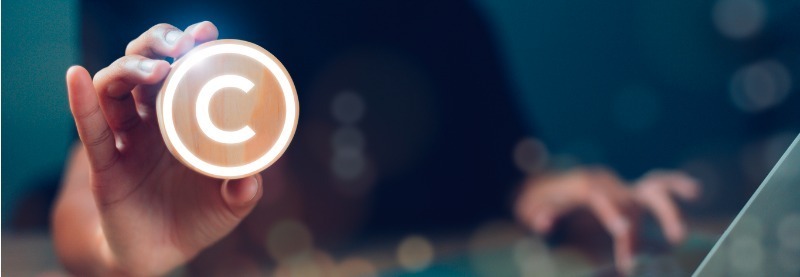Intellectual Property Insights from Fishman Stewart
Mini Article – Volume 25, Issue 8
Share on Social

Calling All Copyright Small Claims!
By Kristyn Webb
In 2020, tucked inside the COVID-19 relief bill, was a piece of copyright legislation that created a new forum for hearing certain kinds of copyright disputes. The Copyright Alternative in Small-Claims Enforcement (“CASE”) Act, created a three-person tribunal housed inside the Copyright Office, called the Copyright Claims Board (“CCB”) to preside over a small-claims court for copyright cases.
Generally, federal courts have exclusive jurisdiction over copyright cases, and often, this presents an insurmountable paywall for individual artists and small businesses to vindicate their rights, especially where the value of the individual copyrighted works are relatively low. Many attorneys decline to take on cases where the cost of litigation outweighs any potential recovery. This small-claims court is aimed, in part, to remedy this issue.
The CCB has been hearing cases since June 2022. So far, it has had mixed reviews. The CCB, often called the “Copyright Small Claims Court,” was designed to be a low cost, efficient forum to adjudicate copyright infringement cases that otherwise may not be heard in court due to the high cost of federal litigation. Part of the cost-saving strategy was making proceedings online, with limited discovery, and user-friendly online forms to make out a claim or defense without necessitating formal legal representation, meaning hiring an attorney would be optional.
However, many users are finding that instead of a promised land of easy-to-use tools and streamlined, simple processes, the CCB has been more of a mirage where users are struggling to understand the necessary elements needed to make a proper legal claim of copyright infringement. Many cases are being dismissed before the alleged infringer is even made aware that a filing has been made.
Now the Copyright Office is actively seeking comments on the CCB’s performance. If you have had an experience with the CCB—good, bad, or otherwise—now is your chance to make your voice heard.
Kristyn Webb is an attorney with Fishman Stewart’s Copyright Practice Group, and holds a master’s degree in copyright law from King’s College London.


Related Content from Fishman Stewart
People have long pondered whether or not the Giza pyramids were indeed solely burial chambers, which was the only known, and archaeologically determined, use—until now.
By 1930, efforts began in New York to replace Mother's Day with Parent's Day because men were more than just breadwinners. Those efforts didn't catch on, probably because in that era, women often spent more time in the home.
In February, Nike and Skims announced that they will be working together on a new brand, NikeSkims. The co-brand will create a new line of training apparel, footwear, and accessories specifically designed to meet the unique needs of women athletes.
Generally, federal courts have exclusive jurisdiction over copyright cases, and often, this presents an insurmountable paywall for individual artists and small businesses to vindicate their rights, especially where the value of the individual copyrighted works are relatively low.
Dedicated to raising public awareness about the importance of encouraging innovation and creativity throughout the world, the World Intellectual Property Organization (WIPO) annually observes World Intellectual Property Day on April 26 to showcase the role that patents, trademarks, industrial designs, copyrights and trade secrets play in our everyday lives.
Hold onto your foam fingers, sports fans – college sports just got a whole lot more interesting! The latest updates to Name, Image, and Likeness (NIL) rules are making student-athletes bigger than ever, and it’s not just about the game anymore.
Did a federal court in Louisiana recently decide that US copyrights are global rights? It seems so.
One of his most famous songs, “Lose Yourself” was recently at the center of a lawsuit. In 2019, Eminem’s publishing company Eight Mile Style sued Spotify claiming that Spotify streamed a number of its musical compositions without proper licenses.
One of the most common challenges is whether AI should be free to train on data that is protected by copyright and owned by third parties without first obtaining permission.
The U.S. Copyright Office (USCO) recently published its latest report on AI and “copyrightability.” In short, the USCO considers only some AI-generated works to be sufficiently creative as to deserve copyright protection, and thus, registration.
IDENTIFYING, SECURING AND ADVANCING CREATIVITY®













